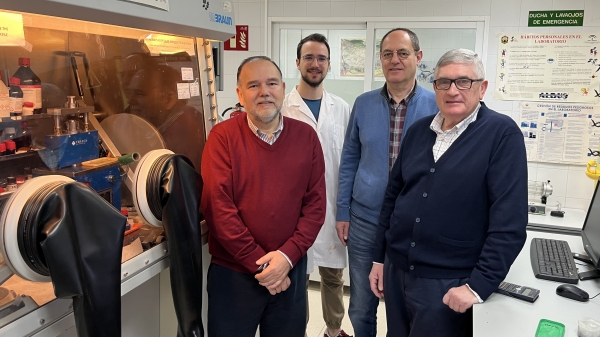A team from the University of Córdoba (UCO) is part of an international consortium developing more efficient and longer-lasting sodium-ion batteries—an alternative to lithium batteries that could revolutionize energy storage and reduce dependence on critical materials such as lithium and cobalt.
The research is part of the MASTER project (Mastering Electrode Surface to Achieve Ultra-High Reversible Capacity), funded by the European M-era.net initiative and the Spanish State Research Agency. The project brings together four research groups from three countries: Spain, Bulgaria, and Turkey.
“Sodium is much more abundant than lithium and more evenly distributed around the world,” explains researcher José Luis Tirado, a participant in the project and professor in the Department of Inorganic Chemistry and Chemical Engineering at UCO. “Lithium, by contrast, is scarce and concentrated in regions like the Bolivia–Argentina–Chile triangle, where its extraction presents geopolitical issues,” he adds.
Conventional lithium-ion batteries use lithium cobalt oxide as the cathode. In addition to issues with lithium's scarcity and geographical concentration, cobalt is also considered a critical metal due to its rarity and the ethical concerns surrounding its extraction, including reported cases of child labor in some African countries.
In contrast, sodium-ion batteries offer a more sustainable solution. However, the technology still has significant limitations. “Sodium is similar to lithium in terms of electrochemistry, but it does not allow for such high voltages, and its capacities may be slightly lower,” Tirado notes.
That’s why the UCO team is working along two complementary lines: increasing cathode stability and improving its operating voltage. “The goal is not to completely replace lithium, but to coexist with it for certain applications,” the researcher clarifies.
Although sodium batteries are heavier than lithium batteries —which could limit their use in some applications like electric vehicles— they could be an excellent alternative for stationary energy storage. That is, for use in cases where weight is not a critical factor, such as large-scale storage of renewable energy.
“The key is that they can store energy from sources like solar panels or wind turbines and deliver it when needed,” explains Tirado, noting that these batteries could play a fundamental role in managing the intermittency of renewable energy.
Moreover, this technology could be adopted at the industrial level relatively easily, since adapting existing infrastructure used to manufacture lithium batteries would only require moderate changes.
An Innovative Design to Improve Stability and Performance
To enhance the stability and performance of sodium batteries, the UCO research group is working on coating the cathode particles with specific materials capable of protecting them without reducing their activity. “We coat the particles with inert materials to shield them from degradation during use, and we also partially substitute elements within the structure to increase the operating voltage,” Tirado explains.
This dual strategy has shown promising results. “In some cases, the increase in stability is so significant that we can speak of a qualitative leap—without the coating, the material wouldn’t even be able to endure a minimum number of cycles,” the researcher emphasizes.
The UCO team has worked with different substituting elements in layered oxides, but primarily with vanadium phosphates. They were pioneers in discovering that partial substitution of vanadium with iron or aluminum increases the operating voltage, bringing it closer to the energy density of lithium batteries.
“It’s a very hot topic,” concludes the researcher, noting that major projects in countries like Germany are investing in this technology. Science magazine recently highlighted that “sodium batteries could one day power a green economy,” affirming the potential of this research line in which the University of Córdoba plays a key role.
The consortium will continue working to optimize these materials, with the goal of matching the performance of lithium batteries while leveraging the sustainability and availability advantages that sodium offers.
This report is included in the activities carried out in the project "Desarrollo de redes de asesoramiento y gestión de proyectos europeos I+D+i en la UCO" with acronym "DevelOPE", within the framework of grant GPE2023-001243-P financed by MICIU/AEI/10.13039/50110001103.


